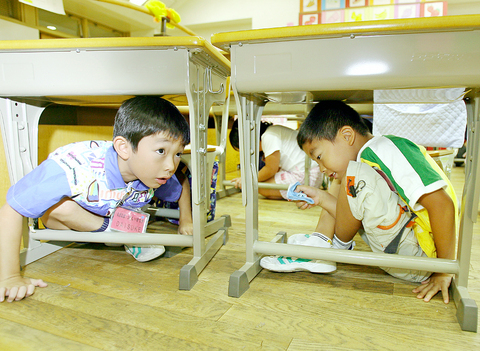A US warship ferried commuters to safety and firefighters blasted water from fire hoses as nearly 1 million people joined nationwide in earthquake preparedness drills yesterday on the anniversary of a temblor that wiped out Tokyo in 1923.
Japanese Prime Minister Junichiro Koizumi held a video-teleconference with Tokyo's governor and the Central Bank chief in a simulated response to a 7.3-magnitude quake in the capital, a disaster that could kill an estimated 11,000 people.
This year's installment of the annual drill also marked the first time that members of the US military in Japan participated, although the US has given permission to Japanese officials to use its air base for drills since 2001.

PHOTO: AFP
Two helicopters were to be dispatched to transfer emergency goods from the US military's Yokota Air Base in western Tokyo to the central Tokyo, according to Tokyo Metropolitan Government official Toshio Kikuchi.
The US military also sent a frigate to Tokyo Bay in an exercise to ferry commuters, Kikuchi said, adding that about 3.9 million people in Tokyo would be unable to return home immediately after a big quake.
Firefighters from South Korea were to take part in rescue operations in a Tokyo residential area, he added.
"I ask the people of Japan to remain calm in this major disaster and ask you to help rescuing others and putting out fires," Koizumi, in a blue work uniform, told a mock news conference.
About 800,000 people across Japan, including more than 70,000 in the capital area, took part in the drills.
The drills are held every year in to commemorate the 1923 Great Kanto Earthquake, which in Tokyo had a magnitude of 8.3 and killed more than 140,000 people.
The preparedness drills in Tokyo were held based on the scenario of a magnitude 7.3 quake striking the city and its surrounding suburbs at 7:15am yesterday.
The drills come as officials are strengthening preparations in case of the dreaded "big one" hits Tokyo and its surrounding area -- a region that is home to about a quarter of Japan's population of 127 million.
In the central Japanese prefecture of Shizuoka, about 640,000 people took part in mock exercises based on a magnitude 8 quake hitting the region early in the morning, according to Shizuoka officials. Experts say that a major quake is overdue in the area surrounding Shizuoka, which is 150km west of Tokyo.
Japan is one of the world's most earthquake-prone nations, and Tokyo has a 90 percent chance of being hit by a major quake over the next 50 years, officials say.
On Thursday, a 4.8-magnitude earthquake jolted the Tokyo region, but there were no injuries or damage.
In 1995, a magnitude-7.2 quake in the western port city of Kobe killed 6,400 people.

Kehinde Sanni spends his days smoothing out dents and repainting scratched bumpers in a modest autobody shop in Lagos. He has never left Nigeria, yet he speaks glowingly of Burkina Faso military leader Ibrahim Traore. “Nigeria needs someone like Ibrahim Traore of Burkina Faso. He is doing well for his country,” Sanni said. His admiration is shaped by a steady stream of viral videos, memes and social media posts — many misleading or outright false — portraying Traore as a fearless reformer who defied Western powers and reclaimed his country’s dignity. The Burkinabe strongman swept into power following a coup in September 2022

‘FRAGMENTING’: British politics have for a long time been dominated by the Labor Party and the Tories, but polls suggest that Reform now poses a significant challenge Hard-right upstarts Reform UK snatched a parliamentary seat from British Prime Minister Keir Starmer’s Labor Party yesterday in local elections that dealt a blow to the UK’s two establishment parties. Reform, led by anti-immigrant firebrand Nigel Farage, won the by-election in Runcorn and Helsby in northwest England by just six votes, as it picked up gains in other localities, including one mayoralty. The group’s strong showing continues momentum it built up at last year’s general election and appears to confirm a trend that the UK is entering an era of multi-party politics. “For the movement, for the party it’s a very, very big

ENTERTAINMENT: Rio officials have a history of organizing massive concerts on Copacabana Beach, with Madonna’s show drawing about 1.6 million fans last year Lady Gaga on Saturday night gave a free concert in front of 2 million fans who poured onto Copacabana Beach in Rio de Janeiro for the biggest show of her career. “Tonight, we’re making history... Thank you for making history with me,” Lady Gaga told a screaming crowd. The Mother Monster, as she is known, started the show at about 10:10pm local time with her 2011 song Bloody Mary. Cries of joy rose from the tightly packed fans who sang and danced shoulder-to-shoulder on the vast stretch of sand. Concert organizers said 2.1 million people attended the show. Lady Gaga

SUPPORT: The Australian prime minister promised to back Kyiv against Russia’s invasion, saying: ‘That’s my government’s position. It was yesterday. It still is’ Left-leaning Australian Prime Minister Anthony Albanese yesterday basked in his landslide election win, promising a “disciplined, orderly” government to confront cost-of-living pain and tariff turmoil. People clapped as the 62-year-old and his fiancee, Jodie Haydon, who visited his old inner Sydney haunt, Cafe Italia, surrounded by a crowd of jostling photographers and journalists. Albanese’s Labor Party is on course to win at least 83 seats in the 150-member parliament, partial results showed. Opposition leader Peter Dutton’s conservative Liberal-National coalition had just 38 seats, and other parties 12. Another 17 seats were still in doubt. “We will be a disciplined, orderly